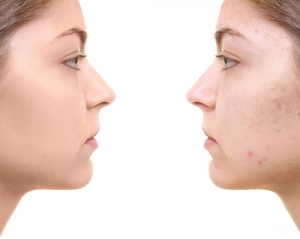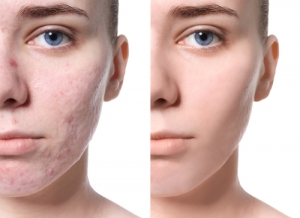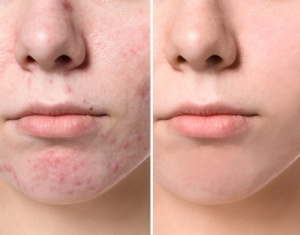Acne Treatment in Dubai, Abu Dhabi and Al Ain
Complete Treatment for Acne/Acne Scars
Acne typically appears on areas of your skin that have the most oil glands, namely, your face, neck, shoulders, back and chest. It occurs where hair follicles become plugged with a combination of excess oil and dead skin cells. This creates a bacteria-friendly environment, and if the clogged pores are infected, the area will become inflamed.
Acne is exacerbated by factors such as stress, hormones (androgens), hot and humid climates and diet. In addition, some medications can trigger acne, particularly some drugs prescribed for epilepsy, anxiety and depression. It’s a good idea to bring a list of all of the medications and supplements you are currently taking when you visit the dermatologist.
There are several myths about what causes acne which, although they are not true, persist in popular culture. For example, despite popular belief, eating greasy foods has little or no effect on acne. Likewise, acne isn’t a sign of poor hygiene – in fact, overcleansing can make acne worse. In addition, having acne does not mean you can’t wear makeup, although our dermatologist will be able to advise you on which products are most suitable. These will be oil-free products that don’t clog pores (known as ‘noncomedogenics’), and an excellent cleanser to remove all traces of makeup at night.
ACNE SYMPTOMS
Acne can vary in severity from person to person, from day to day and in how it shows up. Acne lesions include:
- whiteheads (closed, plugged pores)
- blackheads (open plugged pores – it is the oxidization or exposure to oxygen which can make the clogged bacterial and oil turn a dark colour)
- papules (small red tender bumps)
- pustules/pimples, which are red and swollen due to inflammation of the tissue around the clogged follicles
- cysts (deep pus-filled pimples),
- nodules (large, solid, painful lumps under the skin’s surface).
Acne typically affects the face, forehead, upper back, shoulders and chest, as these are the areas with the most sebaceous (oil) glands. Even though it is more common in teenagers, it can affect people of any age.
When to see a doctor
You don’t need to have severe acne to see a dermatologist. If it is affecting your self-esteem, or if nothing you have tried has helped or your condition appears to be getting worse, a dermatologist is the best person to advise you on treatments and how to avoid scarring.
ACNE DIAGNOSIS & TREATMENT
Our dermatologists will be able to help you to control your acne and minimize scarring through an individualized treatment plan. Treatment options depend on your age as well as the nature and severity of your case, and could include anything from lifestyle changes to medication, creams, intralesional cortisone injections and specialized facials, peels and laser treatments.

 The Neo Elite by Aerolase is a leading device-based solution for medical and aesthetic skin concerns. With the Neo Elite, skin health professionals establish efficient solutions for the most common medical skin concerns and the most in-demand….Read More
The Neo Elite by Aerolase is a leading device-based solution for medical and aesthetic skin concerns. With the Neo Elite, skin health professionals establish efficient solutions for the most common medical skin concerns and the most in-demand….Read More Isolaz is a laser machine approved by the FDA to treat mild to moderate acne. It is a safe and effective treatment that penetrates deep down the pores to attack the bacteria that cause acne….
Isolaz is a laser machine approved by the FDA to treat mild to moderate acne. It is a safe and effective treatment that penetrates deep down the pores to attack the bacteria that cause acne….  Did you ever imagine that you could get rid of various skin impurities, including pigmentation, acne, dullness and early signs of aging, with only one treatment? It is the Fraxel laser! It is an effective….
Did you ever imagine that you could get rid of various skin impurities, including pigmentation, acne, dullness and early signs of aging, with only one treatment? It is the Fraxel laser! It is an effective….  Gentlo is a unique and innovative device that combines RF technology with plasma technology to deliver optimal results, such as tightening, lifting and skin rejuvenation overall. Gentlo is suitable for….
Gentlo is a unique and innovative device that combines RF technology with plasma technology to deliver optimal results, such as tightening, lifting and skin rejuvenation overall. Gentlo is suitable for….  Iris is the world’s first laser with a central monitoring system and the first smart laser system to operate with true 15Hz/s, enabling highly efficient performance in treating pigmented lesions by….
Iris is the world’s first laser with a central monitoring system and the first smart laser system to operate with true 15Hz/s, enabling highly efficient performance in treating pigmented lesions by…. 

